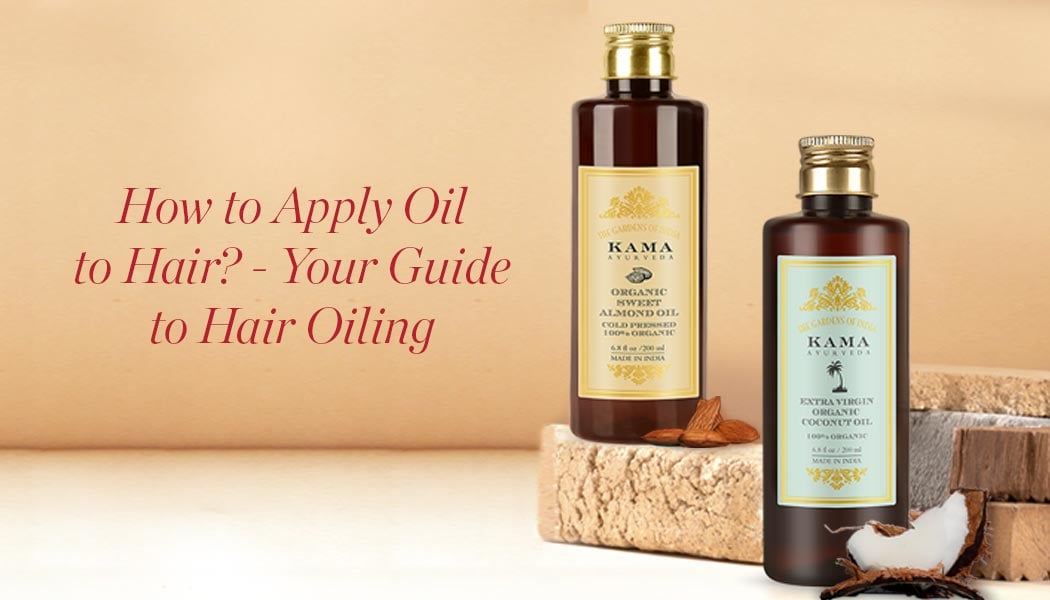In some countries like in India, oiling hair is a tradition that has been passed down for generations. The ancient practice of Ayurvedic medicine recommends hair oiling for strengthening hair and promoting hair growth.
But, what exactly is hair oiling?
It’s the practice of pouring oil in the hair and massaging it in the scalp to increase the moisture in the hair. Oiling also nourishes hair with vital nutrients and vitamins, making the hair appear soft and lustrous.
If you want to start oiling your hair regularly as a part of your hair care routine but have questions about the right time and the correct method to apply oil to hair - this guide will help you
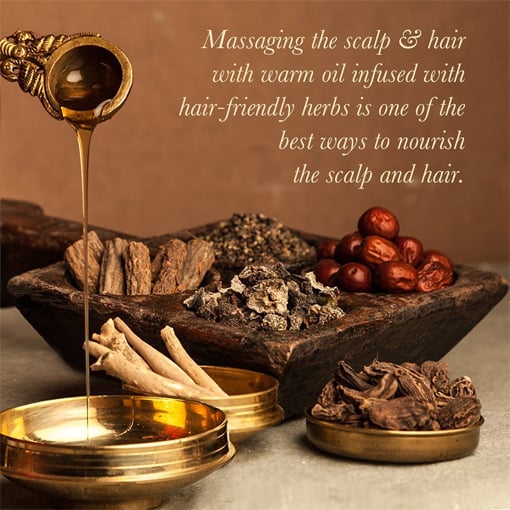
When To Apply Oil On Hair?
The best time to apply oil to your hair depends on your personal preference and schedule. Here are a few common times to apply hair oil that you can choose from based on your hair needs:
- Before washing: Many people prefer to apply hair oil before shampooing their hair. This can help to nourish and protect your hair from the drying effects of shampoo.
- Overnight: Applying hair oil overnight can help to deeply moisturize and nourish your hair while you sleep. You can cover your hair with a shower cap or towel to prevent the oil from transferring onto your pillow.
- Before styling: If you plan to use heat styling tools like a flat iron or curling iron, applying a small amount of hair oil can help to protect your hair from heat damage.
- After washing: Applying hair oil to damp hair can help to lock in moisture and reduce frizz. Simply apply a small amount of oil to the ends of your hair and work your way up towards the roots.
Ultimately, the best time to apply hair oil depends on your individual hair needs and routine. Experiment with different times and methods to find what works best for you.
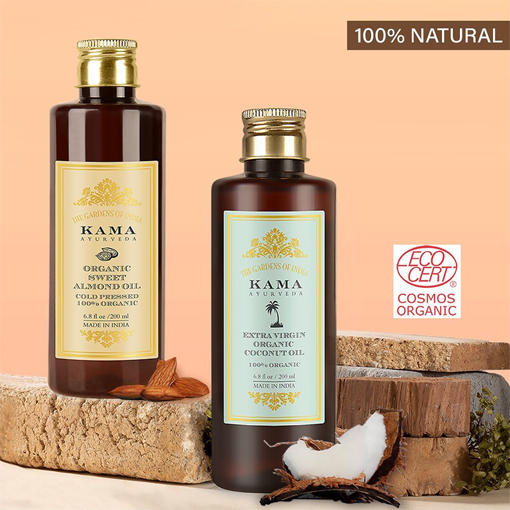
How Often To Apply Oil On Hair?
Ayurveda recommends oiling hair everyday as part of Dinacharya (the daily routine) but this is not realistic for most of us. So, a general rule of thumb is to oil your hair once or twice a week.
You can also decide the frequency of hair oiling based on the following factors -
- Hair and scalp type - If you have dry or curly hair, you may want to oil your hair more frequently, as these hair types tend to be more prone to dryness and breakage.
On the other hand, if you have oily hair or a sensitive scalp, you may want to oil your hair less often, as excessive oiling can cause scalp irritation and greasiness. - Hair texture - It's also essential to keep in mind that the amount of oil you apply and the duration you keep it on your hair depends on your hair's texture and porosity.
For example, if you have fine hair, you may want to use less oil and leave it on for a shorter time than if you have thick or coarse hair.
Ultimately, the frequency and amount of oil you apply to your hair is a personal preference and should be based on your hair's individual needs. It's essential to listen to your hair and adjust your oiling routine accordingly.
How Long Should You Leave Oil On Hair Before Hair Wash?
Generally, it is recommended to leave the oil on your hair for at least 30 minutes to an hour before washing it off.
However, if you have extremely dry or damaged hair, you can leave the oil on overnight for better results. On the other hand, if you have oily hair, you may want to leave the oil on for a shorter duration, such as 15-20 minutes, to avoid excessive oil buildup on the scalp.
It's important to note that using too much oil or leaving it on for too long can make your hair look greasy or weighed down. Therefore, it's essential to use the right amount of oil for your hair type and to rinse it off thoroughly with a gentle shampoo.
Should You Apply Oil To Hair Everyday?
Applying oil to your hair every day is generally not necessary and can actually do more harm than good. Over-oiling your hair can lead to a greasy scalp, clogged hair follicles, and hair breakage.
However, if you have very dry or damaged hair, you may benefit from applying oil to your hair every other day or a few times a week. In this case, it's essential to choose a lightweight oil that won't weigh your hair down and to apply only a small amount to the ends of your hair, avoiding the scalp.
If you have normal or oily hair, it's generally recommended to oil your hair once or twice a week, depending on your hair's individual needs.
Additionally, you can use other hair care products, such as leave-in conditioners or hair masks, to provide your hair with the necessary moisture and nourishment.
Read - Scalp Massage For Hair Growth – Does It Really Work?
Should You Apply Oil On Wet Or Dry Hair?
The best time to apply oil to your hair is when it is dry. This is because dry hair is more porous, which allows it to absorb the oil more effectively, and the oil can form a protective layer on the hair shaft, which can help to prevent damage.
If you apply oil to wet hair, the oil may not penetrate the hair shaft effectively, and it may mix with the water on your hair, diluting the oil and making it less effective.
However, if you prefer to apply oil to your hair when it is wet, you can do so by using a small amount of oil and applying it only to the ends of your hair, avoiding the scalp. This can help to moisturize and protect your hair from damage caused by heat styling or environmental factors.
Is Overnight Oiling Good For Your Hair?
Overnight oiling can be beneficial for your hair, especially if you have dry or damaged hair. When you leave the oil on your hair overnight, it can deeply penetrate the hair shaft and provide intense nourishment and hydration to your hair.
Overnight oiling also boosts blood circulation in the scalp, which can promote hair growth and strengthen the hair follicles. It also provides sufficient time for the hair oils to benefit the hair and scalp with their properties.
For instance, Coconut oil can help combat scalp infections and dandruff with its antifungal and antibacterial properties.
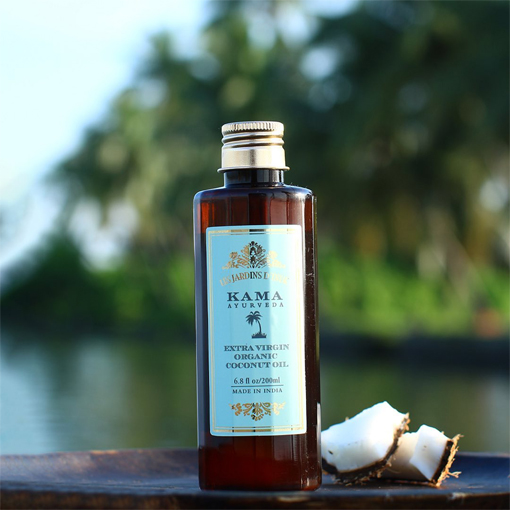
Can You Leave Oil On For 2 Days?
Leaving oil on your hair for two days is generally not recommended as it can lead to excessive oil buildup on your scalp, which can clog hair follicles and cause skin irritation. Additionally, leaving oil on your hair for an extended period can make your hair look greasy, heavy, and unmanageable.
It's generally recommended to leave oil on your hair for a maximum of 8-12 hours, depending on your hair type and individual needs. If you have very dry or damaged hair, you can leave the oil on overnight for better results, but it's important to wash it out thoroughly in the morning.
If you accidentally left the oil on your hair for two days or longer, you may need to wash your hair multiple times with a clarifying shampoo to remove the excess oil buildup and restore your hair's natural balance.
Can Hair Oiling Make My Hair Greasy?
Yes, over-application of the oil to your hair or use of heavy oils can make your hair look greasy and weighed down. When you apply too much oil or use heavy oils, they can build up on your hair, scalp, and hair follicles, making your hair look greasy and dull.
To avoid greasy hair, it's important to choose the right type of oil for your hair type and to apply it sparingly, focusing on the ends of your hair rather than the scalp. You should also avoid over-applying the oil and use only the amount that is necessary to moisturize your hair.
Step-by-Step Guide To Oiling Hair Properly
Get ready to give your hair some love with these easy tips on how to apply hair oil like a pro! Here is a step-by-step guide to oiling your hair properly:
1. Choose the right oil:
Select an oil that suits your hair type and scalp condition. Choose a heavy oil like Coconut Oil if you have dry scalp and a lightweight, quick absorbing oil like Almond oil if you have oily scalp.
2. Warm the oil:
Warming the oil moderately helps in better absorption. When hot oil is applied to the hair it also helps in sealing the cuticles and keeping the scalp moisturized. Take a small amount of oil in a bowl and warm it up indirectly. You can do this by placing the bowl in warm water or using a microwave.
3. Divide your hair into sections:
Divide your hair into sections to ensure that the oil is applied evenly. You can use hair clips to hold the sections in place.
4. Apply the oil with fingertips:
Take a small amount of oil on your fingertips and start applying it to your scalp. Gently massage the oil into your scalp using circular motions, working your way down to the ends of your hair.
5. Apply a warm towel:
Applying a hot towel on your hair after oiling can help to enhance the benefits of the oil treatment. The heat from the towel can help to open up the hair cuticles and allow the oil to penetrate deeper into your hair and scalp. It also improves blood circulation in your scalp, reduces stress, and promotes relaxation.
Wrap the hot towel around your head, covering your hair and leave it on for 10-15 minutes to allow the heat to penetrate your hair.
6. Leave the oil on:
Leave the oil on for at least 30 minutes, or overnight for better results.
7. Rinse it off:
After the recommended time has passed, wash your hair with a gentle shampoo to remove the oil. You may need to shampoo twice to remove all the oil.
8. Condition your hair:
After shampooing, apply a conditioner to your hair to restore moisture and shine.
9. Dry your hair:
Gently towel-dry your hair, and let it air-dry or use a blow dryer on a low heat setting.
Read - Your Complete Guide To A Nourishing Oil Massage For Hair
What Are Some Things To Avoid When Oiling Hair?
- Don't use too much oil, as it can make your hair greasy and weighed down.
- Don't apply oil to your scalp if you have an oily scalp, as it can lead to clogged hair follicles and scalp irritation.
- Don't leave the oil on for too long, as it can make your hair greasy and difficult to manage.
- Don't apply oil to dirty hair, as it can lead to oil buildup and scalp irritation.
- Don't use too much heat to dry your hair after oiling, as it can damage your hair.
- Don't comb or brush your hair immediately after oiling, as it can lead to hair breakage and damage.
Is Hair Oiling Good For Hair? - 7 Top Benefits
Yes, hair oiling is great for hair as it helps to nourish, protect, and promote healthy hair growth. Discover the secret to luscious locks with these 7 top benefits of hair oiling - get ready to say goodbye to bad hair days!
- Nourishes and strengthens hair: Oiling your hair regularly can help to nourish your hair and strengthen it from the roots, making it less prone to breakage.
- Promotes hair growth: Massaging oil into your scalp can help to increase blood circulation, which can promote hair growth.
- Reduces hair fall: Hair oiling can help to reduce hair fall by strengthening hair follicles and preventing breakage.
- Improves hair texture and shine: Oiling your hair can help to improve the texture and shine of your hair by moisturizing it and making it more manageable.
- Prevents scalp infections: The antibacterial and antifungal properties of certain oils can help to prevent scalp infections and dandruff.
- Relieves stress and promotes relaxation: Massaging oil into your scalp can help to relieve stress and tension, promoting relaxation.
- Protects hair from damage: Applying oil to your hair can provide a protective barrier against environmental damage, such as pollution and UV radiation.
Which Oil Should You Use?
The type of oil you should use for your hair depends on your hair type, scalp condition, and hair care needs. Here are some commonly used best hair oils and their top benefits:
- Sesame oil: Sesame oil is a popular choice for hair oiling in Ayurveda, a traditional Indian medicine system. It is rich in vitamins, minerals, and antioxidants that can help to nourish and strengthen the hair. It’s beneficial for those with dry and frizzy hair, as it can help to moisturize and smooth the hair.
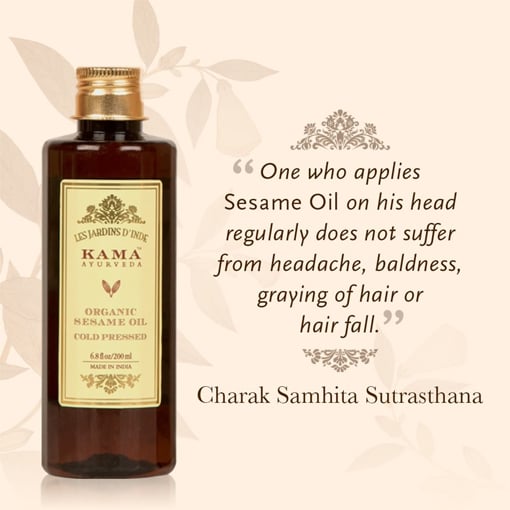
- Coconut oil: Coconut oil is best suited for those with dry, damaged, or frizzy hair. This is because coconut oil is highly moisturizing and can help to restore moisture to dry and damaged hair. The fatty acids in coconut oil can also help to strengthen hair and reduce breakage, making it a great option for those with brittle or weak hair.
- Almond oil: Almond oil is suitable for many hair types, but it is particularly beneficial for those with dry, damaged, or thin hair. It makes hair smoother to the touch and improves hair texture.
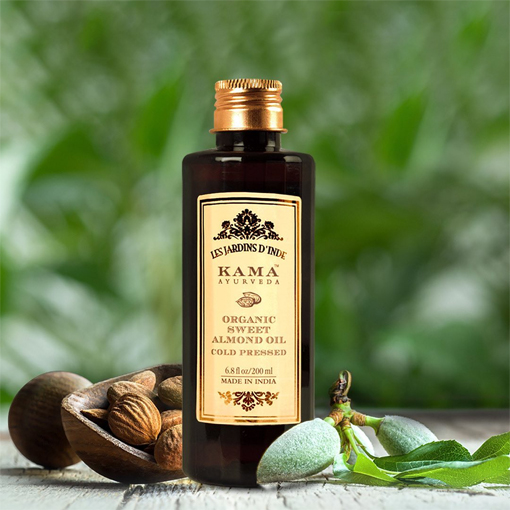
- Bringadi oil: Bringadi oil is an Ayurvedic hair oil that is traditionally used in Ayurveda for promoting hair health and treating hair problems. It is suitable for all hair types, including normal, dry, oily, and combination hair. It treats hair problems such as hair loss, dandruff and hair dryness.
- Essential oils: Essential oils are highly concentrated plant extracts that can be added to carrier oils, such as coconut or olive oil, to enhance their benefits for the hair. Some essential oils for hair such as Lavender oil, Tea Tree oil and Peppermint oil are particularly beneficial. Lavender oil soothes the scalp, Tea Tree oil prevents scalp infections and Peppermint oil stimulates hair growth.
Read - Best Hair Growth Oils For Hair Growth and Thickness
Ultimately, listening to your hair's needs and experimenting with different application methods can help you determine the best timing and frequency for applying oil on your hair. Remember, consistent and appropriate use of oil on hair can lead to stronger, healthier, and more beautiful locks.
